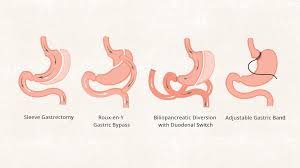
How Bariatric Surgery Transforms Health and Confidence
Obesity is more than just a cosmetic concern—it is a serious health condition that affects millions of people worldwide. It increases the risk of chronic diseases such as type 2 diabetes, heart disease, high blood pressure, and sleep apnea. Many individuals struggle to lose weight through diet and exercise alone. For them, bariatric surgery offers a safe and effective solution that can transform both physical health and emotional well-being.
This article explores how bariatric surgery not only helps patients achieve lasting weight loss but also boosts confidence, improves overall health, and enhances quality of life.
What is Bariatric Surgery?
Bariatric surgery refers to a group of surgical procedures designed to help individuals with obesity lose weight and improve health outcomes. These surgeries work by either restricting the amount of food the stomach can hold, reducing calorie absorption, or a combination of both. Common procedures include:
Gastric Bypass (Roux-en-Y): A small stomach pouch is created, and part of the small intestine is bypassed to reduce calorie absorption.
Sleeve Gastrectomy: About 80% of the stomach is removed, leaving a smaller, tube-shaped stomach to limit food intake.
Adjustable Gastric Banding: A silicone band is placed around the upper stomach to control portion sizes.
Biliopancreatic Diversion with Duodenal Switch (BPD/DS): A complex surgery for severe obesity that combines restriction and malabsorption.
Each procedure is tailored to the patient’s health profile, weight loss goals, and lifestyle.
Physical Health Benefits
Bariatric surgery has profound effects on physical health. The most noticeable benefit is significant weight loss, often resulting in 50–70% of excess weight lost within the first year. Beyond weight reduction, patients often experience:
Improved Diabetes Management: Many patients see a dramatic improvement or even remission of type 2 diabetes.
Better Heart Health: Blood pressure and cholesterol levels typically improve, reducing the risk of heart disease.
Enhanced Mobility and Reduced Joint Pain: Less weight on joints alleviates pain and improves physical activity levels.
Sleep Apnea Relief: Many patients experience better sleep and improved respiratory function.
Long-Term Disease Prevention: Weight loss reduces the risk of obesity-related conditions, including liver disease and certain cancers.
These improvements not only extend lifespan but also enhance overall quality of life.
Emotional and Psychological Impact
Bariatric surgery can also transform mental health and confidence. Individuals who achieve significant weight loss often report:
Improved Self-Esteem: Shedding excess weight helps patients feel more confident and positive about their body image.
Reduced Anxiety and Depression: Physical health improvements and enhanced appearance contribute to better mental well-being.
Motivation for a Healthier Lifestyle: Success in weight loss encourages adherence to exercise and healthy eating habits.
Social and Professional Benefits: Patients often feel more confident in social situations and professional environments, leading to a better quality of life.
The psychological transformation often parallels the physical changes, providing a holistic improvement in well-being.
What to Expect Before Surgery
Proper preparation is critical for success. Before bariatric surgery, patients typically undergo:
Comprehensive Medical Evaluation: Ensures suitability for surgery and identifies any underlying conditions.
Nutritional Counseling: Prepares the patient for post-surgery dietary changes to maximize results.
Psychological Assessment: Helps patients understand the mental adjustments necessary for long-term success.
Lifestyle Preparation: Patients may need to follow a specific diet or exercise regimen before surgery.
This preparation helps minimize risks and sets the stage for successful outcomes.
Recovery and Post-Surgery Life
Most modern bariatric surgeries are minimally invasive, using small incisions for faster recovery. Post-operative care typically includes:
Hospital Stay: Usually 1–3 days depending on the procedure.
Dietary Progression: Patients gradually transition from liquids to pureed foods, then soft foods, and finally regular meals.
Exercise and Lifestyle Changes: Regular physical activity and adherence to a healthy diet are critical for sustaining results.
Ongoing Medical Monitoring: Follow-up appointments monitor weight loss, nutrition, and overall health.
With proper care, patients can return to daily activities within a few weeks and experience steady, long-term improvements.
Long-Term Transformation
The true power of bariatric surgery lies in its long-term impact on health and confidence. Patients often experience:
Sustainable weight loss
Reduced risk of chronic diseases
Enhanced mobility and energy
Increased self-esteem and social confidence
Greater motivation to maintain a healthy lifestyle
These outcomes make bariatric surgery a transformative intervention that extends beyond physical appearance to improve overall life satisfaction.
Conclusion
Bariatric surgery is more than a weight loss solution—it is a pathway to better health, confidence, and quality of life. By reducing obesity-related health risks, enhancing physical function, and boosting self-esteem, bariatric surgery enables patients to live healthier, more fulfilling lives.
For individuals struggling with obesity, consulting a qualified and experienced bariatric surgeon can open the door to lasting health benefits and renewed confidence. The combination of medical expertise, structured support, and lifestyle changes ensures that the transformation is both safe and sustainable.

